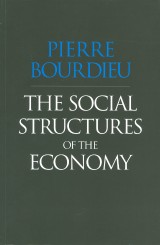Details

The Social Structures of the Economy
1. Aufl.
|
19,99 € |
|
| Verlag: | Wiley |
| Format: | |
| Veröffentl.: | 12.03.2018 |
| ISBN/EAN: | 9780745681634 |
| Sprache: | englisch |
| Anzahl Seiten: | 180 |
DRM-geschütztes eBook, Sie benötigen z.B. Adobe Digital Editions und eine Adobe ID zum Lesen.
Beschreibungen
Much orthodox economic theory is based on assumptions which are treated as self-evident: supply and demand are regarded as independent entities, the individual is assumed to be a rational agent who knows his interests and how to make decisions corresponding to them, and so on. But one has only to examine an economic transaction closely, as Pierre Bourdieu does here for the buying and selling of houses, to see that these abstract assumptions cannot explain what happens in reality. <br /> <p>As Bourdieu shows, the market is constructed by the state, which can decide, for example, whether to promote private housing or collective provision. And the individuals involved in the transaction are immersed in symbolic constructions which constitute, in a strong sense, the value of houses, neighbourhoods and towns.<br /> </p> <p>The abstract and illusory nature of the assumptions of orthodox economic theory has been criticised by some economists, but Bourdieu argues that we must go further. Supply, demand, the market and even the buyer and seller are products of a process of social construction, and so-called ‘economic' processes can be adequately described only by calling on sociological methods. Instead of seeing the two disciplines in antagonistic terms, it is time to recognize that sociology and economics are in fact part of a single discipline, the object of which is the analysis of social facts, of which economic transactions are in the end merely one aspect.<br /> </p> <p>This brilliant study by the most original sociologist of post-war France will be essential reading for students and scholars of sociology, economics, anthropology and related disciplines.</p>
<b>Introduction.</b> <p><b>Part I</b> The House Market.</p> <p><b>Chapter 1</b> Dispositions of the Agents and the Structure of the Field of Reproduction.</p> <p><b>Chapter 2</b> -The State and the Construction of the Market.</p> <p><b>Chapter 3</b> - The Field of Local Powers.</p> <p><b>Chapter 4</b> - A Contract under Duress.</p> <p><b>Conclusion</b> - The Foundations of Petit Bourgeois Suffering.</p> <p><b>Part II</b> Principles of an Economic Anthropology.</p> <p>Postscript - From the National to the International Field.</p> <p>Notes.</p> <p>Index.</p>
"[T]he application of Bourdieu's ideas to the housing market is of great interest and this book can contribute to the debates surrounding alternative or complementary understandings of that which is deemed 'economic', to the current hegemony of classical economic approaches."<br /> <p><b><i>Housing Studies</i></b></p>
<b>Pierre Bourdieu</b> was the Professor of Sociology at the Collège de France.
Much orthodox economic theory is based on assumptions which are treated as self-evident: supply and demand are regarded as independent entities, the individual is assumed to be a rational agent who knows his interests and how to make decisions corresponding to them, and so on. But one has only to examine an economic transaction closely, as Pierre Bourdieu does here for the buying and selling of houses, to see that these abstract assumptions cannot explain what happens in reality. <br /> <p>As Bourdieu shows, the market is constructed by the state, which can decide, for example, whether to promote private housing or collective provision. And the individuals involved in the transaction are immersed in symbolic constructions which constitute, in a strong sense, the value of houses, neighbourhoods and towns.<br /> </p> <p>The abstract and illusory nature of the assumptions of orthodox economic theory has been criticised by some economists, but Bourdieu argues that we must go further. Supply, demand, the market and even the buyer and seller are products of a process of social construction, and so-called ‘economic' processes can be adequately described only by calling on sociological methods. Instead of seeing the two disciplines in antagonistic terms, it is time to recognize that sociology and economics are in fact part of a single discipline, the object of which is the analysis of social facts, of which economic transactions are in the end merely one aspect.<br /> </p> <p>This brilliant study by the most original sociologist of post-war France will be essential reading for students and scholars of sociology, economics, anthropology and related disciplines.</p>

















